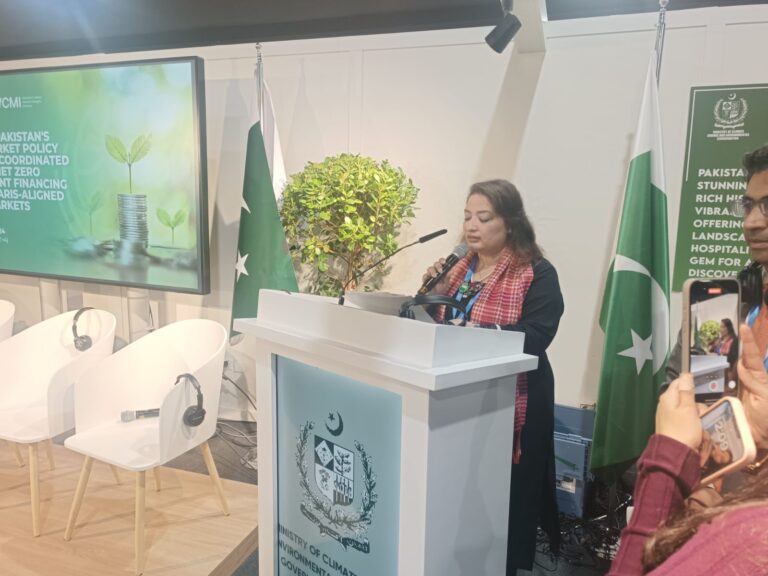Islamabad, Nov 17: Pakistan Launches First National Carbon Market Policy to Boost Green Investment. As part of efforts to achieve environmental sustainability and climate resilience in the nation, Pakistan is now actively exploring the development of carbon markets as a key strategy to meet its climate goals, attract green investments, and transition toward a low-carbon economy, according to Romina Khurshid Alam, the Prime Minister’s Climate Change Coordinator.Pakistani food
At a high-level event called “Launch of Pakistan’s Carbon Market Policy,” she declared, “I can say with confidence that Pakistan is now ready to lead, innovate, and work with local private sector as well as international partners for the development of carbon markets to attract investments in green initiatives for achieving climate goals under the Paris Climate Pact.”
On the fringes of the COP29 global climate conference in Baku, a panel on coordinated access to net zero development financing through Paris-aligned carbon markets was held here at the Pakistan Pavilion. To entice green investment, Pakistan introduces its first National Carbon Market Policy. Pakistani food Pakistan may encourage companies and industries to embrace cleaner technology and practices by taking part in these marketplaces, she said. These markets enable organizations to purchase, sell, or offset their emissions and function based on “cap-and-trade” or credit-based processes.
“This launch is only the start. She told the attendees of the launching ceremony, which included representatives from international civil society organizations, delegations from other nations, academia, researchers, policymakers, and the media, that the Pakistani government is committed to assisting the growth of this market, making sure it becomes a pillar of our climate strategy and a catalyst for sustainable development.
The planned creation of a strong carbon market mechanism, according to the PM’s climate aide, would be in line with Pakistan’s commitment to the Paris Agreement and allow the nation to profit from its emissions reductions while promoting sustainable development and climate action by funding a range of adaptation and mitigation-related projects.
The PM’s climate aide explained the nature of potential carbon markets in Pakistan to the attendees, saying that the country wants to speed up the adoption of clean technology and draw in investment in industries and projects that have a large potential to reduce emissions, such as forestry, waste management, energy, and agriculture.
To entice green investment, Pakistan introduces its first National Carbon Market Policy. “We are also ready to work together with partners and collaborators interested in jointly setting up carbon markets to make this national carbon market policy not just functional but transformative, paving the way for a more sustainable and resilient future.”
Romina Khurshid Alam said, inviting potential partners from local, regional, and international communities interested in developing carbon markets in the nation. “Both domestic and international cooperation are essential to the development of Pakistan’s carbon market. In her keynote speech, she emphasized, “We welcome partnerships with international investors, organizations, and governments to ensure that this market becomes a regional and global success story.”
A regulated and transparent carbon price compliance market (CM) and voluntary carbon market (VCM) in Pakistan would encourage the private sector to enter and offer greenfield projects based on climate resilience and adaptability, according to the PM’s climate assistant Romina Khurshid Alam.
We would, however, be more focused on leveraging the advantages of COP29 for all the countries that are reducing their emissions through collaboration and cooperation in the carbon market crediting, she continued.
In her introductory remarks, the Secretary of the Climate Change and Environmental Coordination Ministry stated that Pakistan’s Carbon Market Policy is the result of two years of intense effort and a framework intended to operationalize carbon markets as a crucial tool for achieving the country’s development and climate goals.
In accordance with global standards and best practices, these policy guidelines establish a precise regulatory framework for the development and administration of carbon market operations in Pakistan, both voluntary and compliant,” she continued.
Through this policy, the nation hopes to speed up the adoption of clean technologies and draw investment to industries and projects with substantial potential for reducing emissions, such as forestry, waste management, energy, and agriculture, according to the secretary of the ministry of climate change. She anticipated that the rules would help guarantee that carbon markets produce significant economic and social co-benefits throughout Pakistan while driving actual, verifiable reductions.
Ministry secretary Aisha Humera Moriani emphasized, “By introducing this policy, Pakistan indicates its willingness to participate in international carbon markets, inviting both domestic and foreign partners to join us in advancing a resilient, low-carbon economy with strong accountability and impact at its core.”
Additionally, the ministry secretary emphasized that the globe is currently at a turning point in its collective response to the global climate problem. “We are all reminded of the urgency of our climate action as the world community comes together here at the COP29 global climate summit – a mission that crosses boundaries, brings together diverse communities, and demands bold, decisive action for the sake of our present and future generations,” she said.









